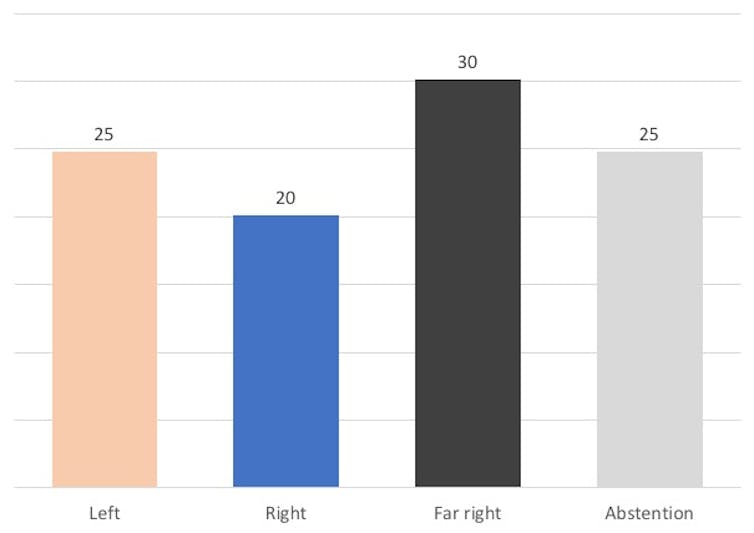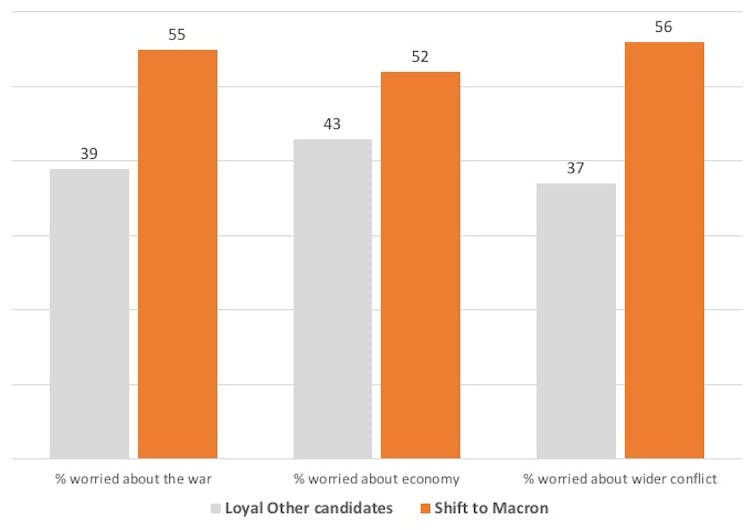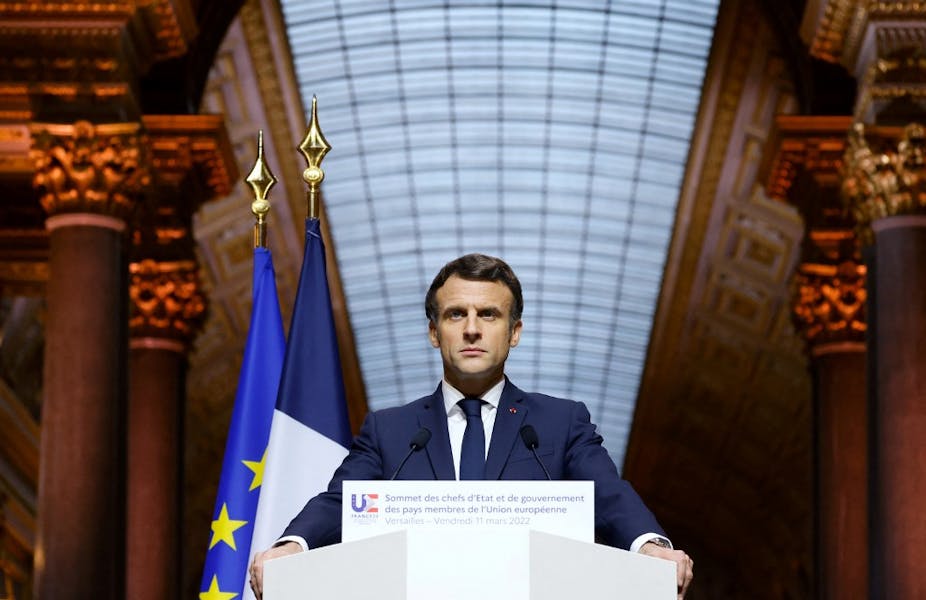As they watch the war in Ukraine escalate, French voters are rallying around President Emmanuel Macron. This rally effect is fuelled by deep anxiety about the war, and it may eventually give Macron a decisive boost in the April presidential election.
Since John Mueller’s seminal work in the 1970s, the “rally round the flag” phenomenon has been an important fixture of political science. At the core of it lies the idea that major international crises increase national cohesion among both elites and voters. This generally translates into increased support for the incumbent.
In the context of this year’s presidential election in France, an important aspect of the rally effect, I argue, is voter anxiety about the war in Ukraine.
The results of the latest wave of the National Election Panel conducted by Sciences Po Paris’s Centre for Political Research (CEVIPOF) among a large national sample on March 2-3 suggest that such anxiety is a significant driver of the recent surge in support for Macron.
Under shock, voters turn to Macron
According to this survey, the war in Ukraine has become a salient political issue for 50% of the French. For another third, the war will be important to their vote in April, up to 55% among Macron’s voters. Amid fears of nuclear terror, an overwhelming majority (90%) say they are very or somewhat worried about the war and its consequences.
As would be expected, since the outbreak of the war, we have seen cross-partisan support for the president from left to right of the political spectrum. It is no surprise that Macron waited until the last minute to officially declare himself candidate. The president has been showcasing his diplomatic skills, hoping to get momentum from taking over the reins of the EU. Pictures of European leaders gathering around Macron for Ukraine war talks in Versailles on March 10 will certainly help him continue building his profile as key player in the ongoing crisis.
Dissonant voices have been few. Even radical right challengers like Marine Le Pen and Éric Zemmour have had to back the president, while taking the hit for their pro-Putin positions and, in Le Pen’s case, for her past financial connections with Russia.
More to the centre of French politics, Valérie Pécresse, the Republican candidate, is still struggling to make herself heard in the campaign following a disastrous meeting in Paris last month. More importantly, the candidate for the LR party has yet failed to find her political space between Macron and the far right.
A substantial spike in approval ratings for Macron
As our poll suggests, none of the challengers seem to be convincing voters that they could do a better job as future commander in chief. For about 60% of the French, things would even go worse if one of the radical candidates won the election.
Despite domestic socio-economic grievances and frustrations over rising living costs, the French are rallying around their country’s leader. Polls show a substantial spike in approval ratings for Macron since the beginning of the Ukraine war: the president is up five points in the March ELABE-Les Echos Barometer.
Such increase in popularity is met with a surge in voter support. According to our survey, Macron has increased his lead in the first round by four points, from 26% just before the war up to 30% on March 2-3. In the run-off, he is set to win by a very large margin against any of his potential contenders.
The panel design of our survey allows to look at individual-level change behind net shift in the overall voting intention balance in the first round. As our data in the graph below show, voters are turning to Macron from all across the board: of all “new” voters who have rallied around the president in the last week, about a third (30%) come from one of the far right candidates, a fifth (20%) from the right, a quarter (25%) from the left while another 25% previously said they would abstain or cast a blank vote.
Figure 1. Where do Macron’s new voters in March come from?

Voter anxiety drives electoral shifts
Moreover, our data suggest that war anxiety may be a significant driver of such individual shifts. We find significant differences with regards to voter concern and perception of the consequences of the conflict.
Those who have left other candidates to rally around Macron since the beginning of the Russian invasion show a much higher level of anxiety. Among those who shifted to Macron, 55% said they are very worried about the war, compared with only 39% among voters who remained loyal to other candidates during the first week of the Russian invasion.
Figure 2. War anxiety among loyalists and new Macron voters

Voter fears primarily concern a broader conflict in Europe, much less economic consequences. Among voters who have turned to Macron in just the past few days, 52% say they are very worried about the impacts of the crisis on France’s economy, as opposed to 43% among those who have stayed with other candidates. There is a larger gap when voters contemplate a possible wider conflict, with a 19 point difference between the two groups (56/37).
Will the rally effect last long enough for Macron to win in April?
History has taught us that rally effects generally tend to be ephemeral and that they do not always allow incumbents to divert public attention from domestic difficulties. Yellow ribbons do not necessarily improve the incumbent’s long-term political standing, so we should expect changing political, economic and international circumstances to weigh on the course of the campaign.
Domestic issues have already made their comeback in the campaign. In his first public meeting after his official announcement, Macron put France’s pension reform back in the spotlight. His controversial plan goes even further than the original reform that was put on hold by the pandemic, and which had given rise to large social and political protests. Macron’s more ambitious plan to move the retirement age from 62 to 65 years has been met with strong criticism by his rivals, giving them a first chance to divert attention from the war.
Meanwhile, this could win him even more support from the conservative right at a time when Pécresse’s support is taking a plunge in our survey, down one point at 11.5% since last week – now in fifth position – and no less than four points since early February.
Given the proximity of the election, however, there is only a short window of opportunity for all his challengers to sing along to their favourite “anti-Macron” tune. French presidential elections are notoriously unpredictable, but Emmanuel Macron seems nevertheless on a clear path to winning re-election in April.


